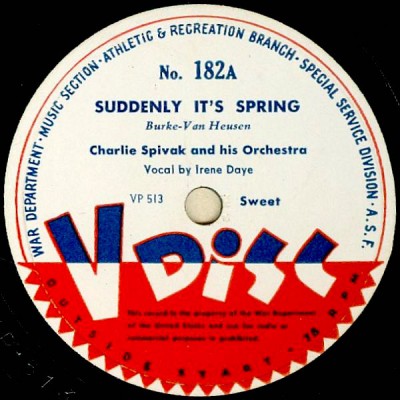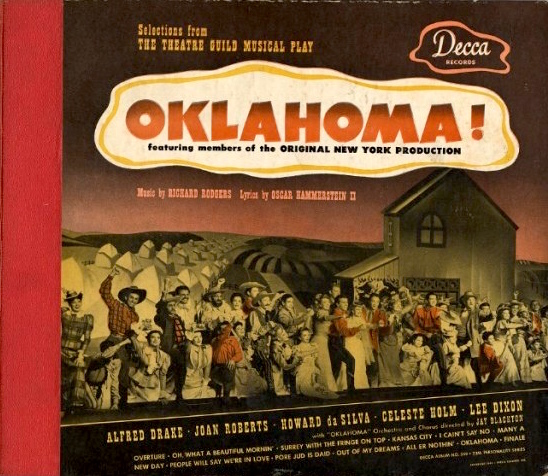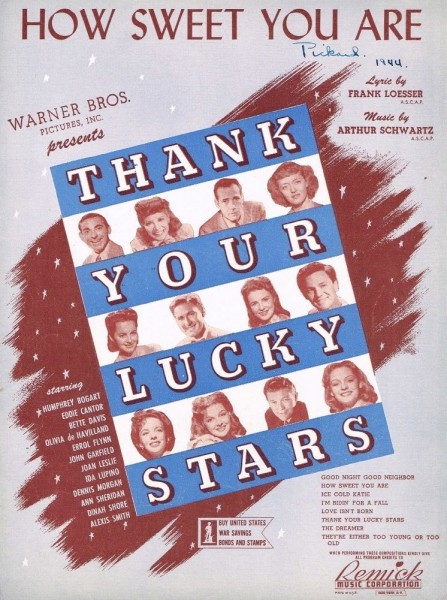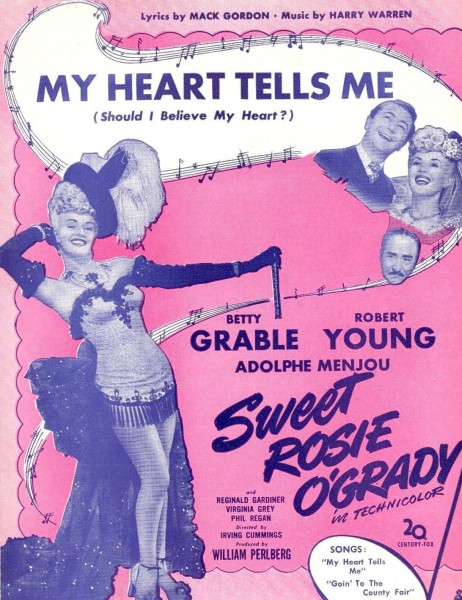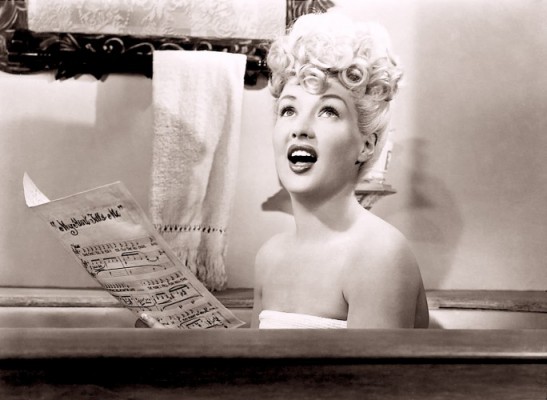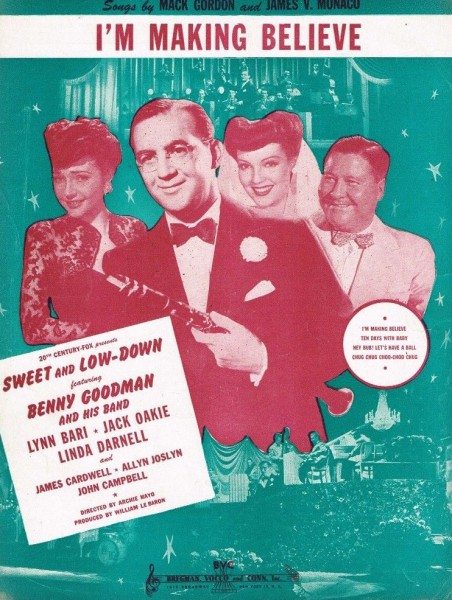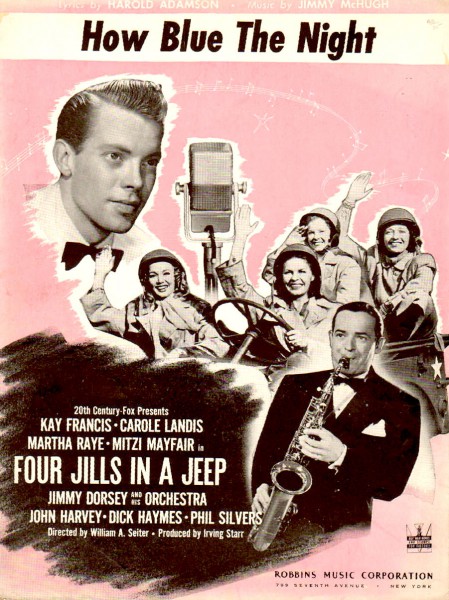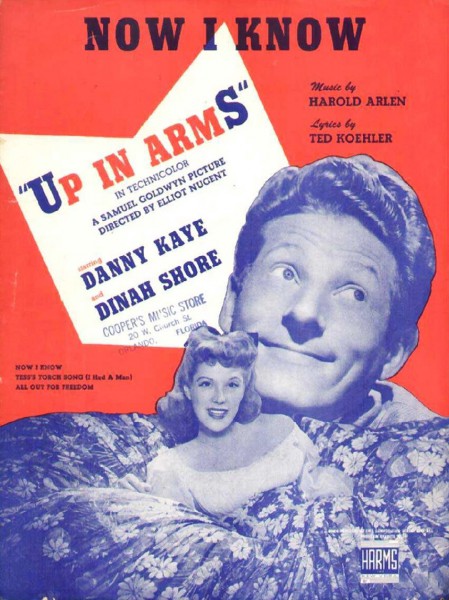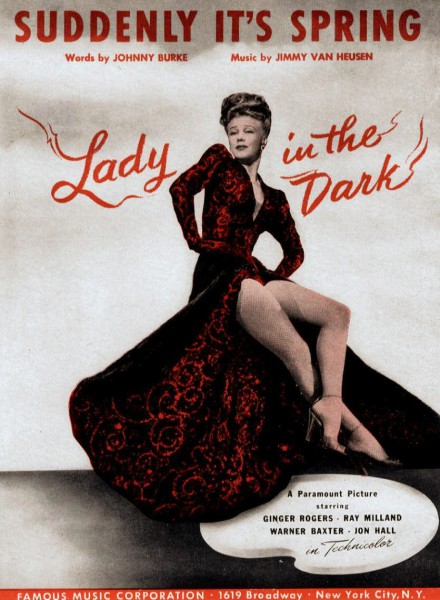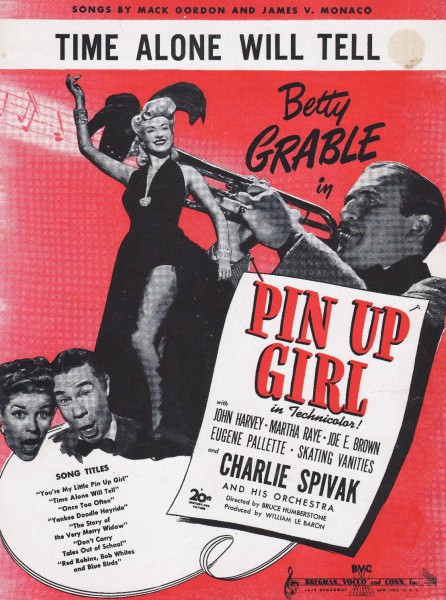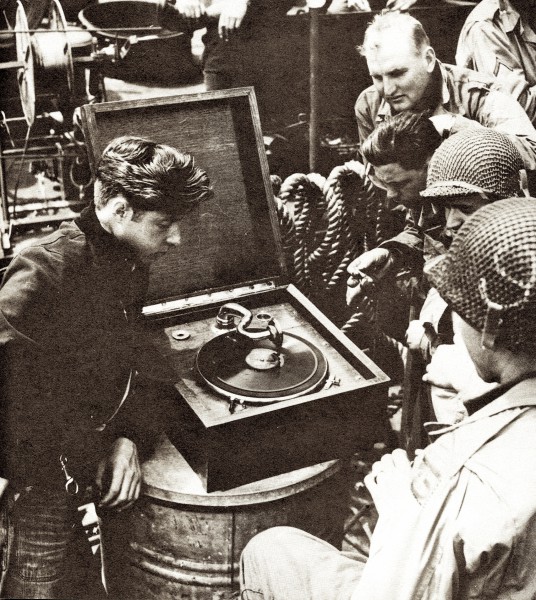I begin this entry by repeating a bit of what I wrote about the last Glenn Miller sessions by his civilian band in July 1942.
James C. Petrillo, the volatile head of the American Federation of Musicians (AFM), made an announcement in June 1942. Due to a dispute over recording fees for musicians between the record companies and the AFM, Petrillo decreed that union musicians must stop all recording engagements starting August 1, 1942. Even a plea from President Roosevelt, arguing that wartime was not the moment to stop producing morale-building music, couldn’t sway Petrillo.
The record companies began a non-stop session schedule to get as many tunes on wax from their artists before the deadline. Since no one knew how long the ban would continue, even songs from films and shows that would not open until 1943 were fed into the pipeline. As it played out, younger companies Decca and Capitol, who depended heavily on current pop songs, caved in October 1943. RCA Victor and Columbia held out until November 1944, denying posterity the opportunity to fully document the Swing Era at its final peak and the early experiments in be-bop.
Quixotically, during this terrible period in American history, pop and theater songwriting were maintaining a very high level of quality. Great new songs were flowing nonstop and fans clamored for recordings of them, but none were to be had from the major companies. The new Broadway show Oklahoma!, for instance, contained a batch of great Rodgers & Hammerstein songs that could only be heard live or on radio. For awhile, Columbia, Decca and RCA experimented with a capella accompaniment, backing Frank Sinatra, Bing Crosby, Dinah Shore and Perry Como with large choruses singing and humming in the background. These anemic-sounding discs included, of course, songs from Oklahoma!
When Decca and Capitol capitulated to Petrillo’s demands, one of the first sessions held by Decca was a recording of the original cast album of Oklahoma!, which sold over a million copies quickly.
Some wartime hit songs managed to reach permanent standard status, despite the lack of quality recordings. These include YOU’LL NEVER KNOW, LONG AGO AND FAR AWAY, SPEAK LOW, HAPPINESS IS A THING CALLED JOE, MY SHINING HOUR, IT COULD HAPPEN TO YOU, THEY’RE EITHER TOO YOUNG OR TOO OLD and even novelties like MAIRZY DOATS and MILKMAN, KEEP THOSE BOTTLES QUIET.
Other 1943-44 tunes weren’t so lucky and faded away before they were able to make much of an impression. Here are 10 favorite numbers, mostly from films, that deserved better.
HOW SWEET YOU ARE (by Arthur Schwartz & Frank Loesser). A lovely, evocative ballad from Thank Your Lucky Stars, Warner Bros. entry into the all-star patriotic revue genre. Schwartz and Loesser wrote a full score that was performed by such stars as John Garfield, Errol Flynn, Ann Sheridan, Hattie McDaniel, Bette Davis and Eddie Cantor. Oddly, the worst singer among them, Bette Davis, scored big with THEY’RE EITHER TOO YOUNG OR TOO OLD, which hit just the right topical note, lamenting the loss of all the young, attractive men to the armed services.
Radio singer Dinah Shore made a grand film debut here and creamily sang several songs, including HOW SWEET YOU ARE, one of many wartime paeans to absent lovers.
THE CANTEEN BOUNCE (by Johnny Fortis & Max Spickol). This songwriting team wrote many forgettable songs, but this spritely swing number is not one of them. It’s a catchy number that got radio plays by Duke Ellington, Les Brown and Jerry Wald, but no recordings, which is a shame.
MY HEART TELLS ME (by Mack Gordon & Harry Warren). The stellar songwriting team of the era crafted this gorgeous song for top Fox star Betty Grable to perform in Sweet Rosie O’Grady. Soaking in a bathtub and reading the damp sheet music with no orchestra in sight, Betty delivers an iconic rendition.
The number had little longevity, unlike Gordon & Warren’s other big 1943 composition for a Fox blonde. Their YOU’LL NEVER KNOW, introduced by Alice Faye in Hello, Frisco, Hello won the Best Song Academy Award.
I’M MAKING BELIEVE (by Mack Gordon & Jimmy Monaco). Benny Goodman introduced this rhythmic ballad in Sweet and Low-Down, a Fox band musical, with Linda Darnell and Lynn Bari, who sang the song with a dubbed voice as she had done in both Glenn Miller films. Eddie Sauter wrote a beautiful arrangement for Benny, which likely would have been a big hit had the band been able to record it. Harry James, Les Brown, Cab Calloway and Charlie Spivak all recognized a good tune when they heard it and played it on air, but only Hal McIntyre got to wax it after the ban ended. By then, the song had passed its chance for popularity.
COME OUT WHEREVER YOU ARE (by Jule Styne & Sammy Cahn). Frank Sinatra’s first starring film for RKO, Higher and Higher, had produced three fine ballads for the singer – I COULDN’T SLEEP A WINK LAST NIGHT, THE MUSIC STOPPED and A LOVELY WAY TO SPEND AN EVENING. Sinatra recorded them for Columbia with choral accompaniment and composers Jimmy McHugh and Harold Adamson even got an Oscar nomination for WINK. For his next film, Step Lively, Frank insisted on hiring Styne and Cahn, who were personal friends. Their efforts produced several forgettable ballads and this charmer of a rhythm number. Sung in the film as a duet with lovely Gloria DeHaven, it should have become a Sinatra favorite, but without a recording, it went nowhere.
HOW BLUE THE NIGHT (by Jimmy McHugh & Harold Adamson). Composers McHugh and Adamson also wrote for Sinatra’s biggest 1940s rival, Dick Haymes. The younger crooner made his film debut in Four Jills and a Jeep, another all-star patriotic effort from Fox, built around the real-life wartime USO tour taken by Martha Raye, Kay Francis, Carole Landis and Mitzi Mayfair. Haymes played a callow singing soldier, but didn’t really make an impression on film until 1945’s State Fair and Billy Rose’s Diamond Horseshoe. A whole raft of bands broadcast this insinuating beguine, from Duke Ellington and Jimmy Dorsey to Woody Herman, Stan Kenton and Count Basie, but once again, no studio recordings.
NOW I KNOW (by Harold Arlen & Ted Koehler). Another lightly Latin beguine, written for Danny Kaye’s lavish premiere vehicle for Samuel Goldwyn, Up in Arms. Danny took over the screen like he was born for it and the film was a solid smash. Somewhat lost along the way were several songs by Arlen & Koehler, reteaming the 1930s Cotton Club composers. Dinah Shore sang two of them, the catchy novelty, TESS’ TORCH SONG and NOW I KNOW. One of Arlen’s most inventive, rangy melodies, it only got recorded by Cootie Williams’ band for the tiny Hit label, with a vocal by young Pearl Bailey.
SUDDENLY IT’S SPRING (by Johnny Burke & Jimmy Van Heusen). For the 1944 film version of the Kurt Weill-Ira Gershwin Broadway musical Lady in the Dark, Paramount dropped nearly all the original score (including the haunting MY SHIP) and only added one new number, the almost-equally haunting SUDDENLY IT’S SPRING. Sung by Ginger Rogers during an elaborate wedding dream sequence, the studio decided to cut Rogers’ vocal, leaving only a choral rendition. Without a full-out performance of the song, it went exactly nowhere with the public. Happily, in the 1950s, June Christy, Chris Connor, Stan Getz and George Shearing unearthed and recorded it.
TIME ALONE WILL TELL (by Mack Gordon & James Monaco). Lyricist Mack Gordon scored yet again, this time with composer Jimmy Monaco, on another terrific ballad for a Betty Grable film, Pin-Up Girl. Betty didn’t sing it, however. It was given to Charlie Spivak’s band with June Hutton and the Stardusters, who performed it beautifully. Part of the number was covered by dialogue, which was a shame, since Spivak did not otherwise preserve it, even in a radio performance. Just about the only recording made was by Ella Fitzgerald, who also managed to cut I’M MAKING BELIEVE for Decca.
SLOWLY (by David Raksin & Kermit Goell). Here’s another case of a worthy song that was excised from the film that was supposed to feature it. David Raksin had written the score for Otto Preminger’s popular 1944 Fox movie, Laura. With a lyric added by Johnny Mercer, the theme melody became a major success and a lasting standard. Preminger hired Raksin to score his next film, Fallen Angel. Desiring another hit song, he pushed Raksin and lyricist Kermit Goell to come up with one. SLOWLY was the result. Maybe it wasn’t another LAURA, but SLOWLY has it’s own definite charms. The song was heard in the background on a diner jukebox, played often by waitress Linda Darnell. Dick Haymes sang the jukebox record. Star Alice Faye also sang it in a scene while driving with Dana Andrews. For some reason, Preminger cut the Faye vocal before the film was released, in order to feature Linda Darnell more prominently. This was one of the reasons Alice quit the Fox studio as soon as the picture was completed. Aside from records by Haymes and Kay Kyser, the song faded rapidly without a boost from the movie, which also was not a success.

